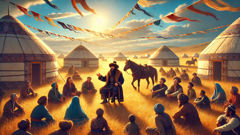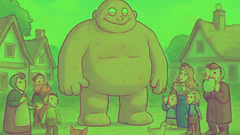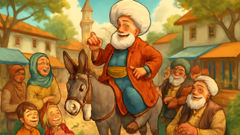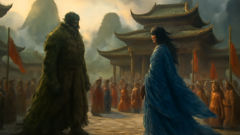Introduction
On the open Kazakh steppe the wind carries stories like dust, and some of those stories stick to your boots forever. Aldar Kose was a man without a beard and with a permanent grin, a lean figure who walked with the sure step of someone who had learned early how to read both faces and fortune. People in yurts and towns told of him as a trickster, but not the cruel kind; he was the kind whose jokes had the warmth of summer tea, whose jests rolled like a good song and whose victories turned the greedy red as a beet in market light. Aldar’s plots read like a skillful braid: threads of humor, a pinch of daring, deep respect for the ordinary, and a stubborn belief that those with means should not use their weight to crush the poor. These tales move across braided paths and river crossings, into packed bazaars, and to the carved benches of khan’s courts where silk met steel and gold met glances. Here, we gather a collection of Aldar Kose stories—original, rooted in Kazakh tradition, and polished for the modern reader—where every prank carries a lesson and every laugh preserves something honest about life on the steppe. Read them aloud by firelight or quietly in a corner of a teahouse, and you’ll hear the gulls of the wide plains and feel a horse’s breath on a cold morning. The steppe is wide, but Aldar’s wit is wider still; he will remind you that a clever word can be as warm as a fur coat and as sharp as a herder’s wit on a stormy night.
The Market of Smiles
The market was a patchwork of voices and colors: the heavy bass of tanners’ hammers, the crisp clink of copperware, girls in embroidered jackets calling prices for dyed wool, and camels that sighed like old kings. Aldar Kose arrived in such markets with no letter of trade and little more than the broad brim of a hat and eyes that sparkled with intent. He loved markets because their noise offered the perfect cover for small storms of mischief—storms that usually ended with the proud pockets of the greedy emptied a little, and the pockets of the poor refilled with bread or laughter.
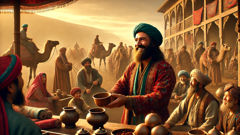
One morning, Aldar wandered to the booth of a merchant called Tolegen, a man who kept gold like a man guards a secret and who never spared a smile for anyone who did not rank his coin. Tolegen sold camel saddles sewn with silver thread and priced items as if they were heirlooms of emperors. Seeing a mother and two children peering at a simple wooden bowl through the stall bars, Aldar moved like a careful breeze. He bought a cracked teacup from a potter at the edge of the market, an old cup rimmed in brown from years of tea. Aldar cradled it in both hands and, with the solemnity of a man announcing the moon, declared to the crowd that the cup had been to the roof of the world. He spun a short tale of the teacup’s journey—how it had traveled with a caravan that escaped a blizzard, how a falcon had rested on its rim, how in a desert night it had reflected a star so bright the shepherds thought it a comet.
A hush fell; even the camels seemed to lean in. Aldar took a sip as if honoring a saint, and then held the cup to the light so everyone could see the crack as though it were a map. "This cup knows the taste of altai tea and the salt of steppe wind," he intoned. "It should not be sold cheaply. It will only sit well with a man who understands the cups of the world."
Tolegen stepped forward, the merchant’s chest puffed with the dignity of his purses. "You claim this cup is special, traveler? Then you must give me the secret price, or at least tell me where it was found. People like secrets bring price."
Aldar smiled. "It was found at the bottom of a sack of comically small scrolls carried by a scribe who wrote jokes for bored nobles. The price is a trifle: the first man who can make this cup laugh may take it for free."
The crowd tittered, and Tolegen felt his grin stretch like leather. "Aldar Kose, do not make the market into a school of riddles. Your tricks are a nuisance."
Aldar bowed slightly. "Then I’ll teach the cup to laugh. All it needs is a good tale and a proper audience." He invited the children forward and began to tell a story so silly that the market itself seemed to chuckle. He used the cracked rim to show the cup how to tip and chime like a bell, hummed into its curve and made faces as if negotiating with a stubborn camel. The children laughed first, then the mothers, then the traders who had pockets full of spice and secrecy. Even Tolegen tried to hold in a smile, which cracked his face like thin ice. The cup didn’t laugh aloud, of course, but the sound of good-hearted mirth spread through the stall like fire in straw. Aldar handed the cup to the smallest child, saying, "Hold it with both hands and promise never to sell your first laugh." The child looked at Tolegen with the solemnity of someone learning a new prayer, and Tolegen, who had been waiting for profit as a man waits for rain, felt something else—that warm, rare feeling called community—seep into his chest.
Against his own bargaining instincts, Tolegen let the cup go. He claimed later that he had given it away as an act of generosity, but the truth is he had given it because something in the market that day was more valuable than gold: a laugh that loosened the clamps on greed.
On another market day, Aldar strolled past a row of men who measured grain with narrow-minded rules. A taxman named Beybit lifted his chin like a tower and demanded precise measures that favored his ledger. He would notch an extra handful from every sack crossing his palm and call it ‘‘court duty.’’ People grumbled and muttered but did not fight because the taxman wore a blade and a cold stare. Aldar noticed the thinness on the faces of families who had recently toiled in a neighbor’s fields without full thanks, and he could not abide it. He lounged under a shed and struck up a conversation with the taxman about the virtues of a fair scale.
"A fair scale," Beybit declared, "is for weak men. A good scale belongs to the strong."
Aldar stroked an imaginary beard. "And what if a scale is hungry, Beybit? What would you feed it?"
Beybit frowned. "It takes grain, man. Feed it with grain and you will have full accounts."
Aldar suggested a strange wager: a day of measuring by song. He proposed that market measures be sung rather than counted for one afternoon. The taxman—intrigued by novelty and always eager to show his cleverness—agreed, certain that his ledger would remain in his favor. Aldar moved through the market teaching the bakers and wool-sellers melodies to accompany their measures. The tunes were ridiculous, full of rising notes at the right time and falling notes that matched the dip of a scale’s arm. When the musicians began, people measured with smiles, the sellers taking care to hit notes and measures in equal rhythm. The taxman found himself involuntarily tapping his foot, and with each impossible flourish the audience heard, he had to listen longer to keep his pride from stumbling. As song replaced suspicion, sellers who had once been too afraid to call out a short measure called it boldly, and the market heard those brief claims in chorus. By afternoon, when the taxman tried his usual tricks, the crowd, now practiced in musical measurement, shouted the correct tally in a single voice. Beybit could not notch an extra handful without being contradicted with melody and laughter. He left the market that day with a sore throat and a new respect for public reckoning.
These market tales show Aldar’s simplest method: to turn the stage of greed into a place where people remembered their own worth. He rarely stole; instead, he made miserliness unworkable by changing the rules of the room. He taught the steppe that a measure can be a song, and a cup can be a memory.
Sometimes his schemes were smaller and tenderer. A widow named Anar kept two flocks and an old mare; she wore a patch on her shoulder where a boy used to stand. Aldar visited her and offered to buy a goat he had no intention of paying for. He bartered in riddles and sweet nonsense, and when they argued, he convinced the surrounding herders to declare Anar the best milk-brewer of the season. The honor meant more than coin; families sent her extra wood, a sack of barley, and a child was given a place to herd in the mornings. Aldar’s trick had no obvious villain—only the soft, communal shift of kindness coming into play because someone with a bright voice decided to sing another tune.
Many such episodes happened on the same path: a market, a laugh, a small but decisive nudge toward fairness. Sometimes Aldar’s jokes were a mirror held to power, one that made even the proud find humor about themselves. That mirror was rarely cruel, and when the proud saw their own faces bend with laughter, they often learned to bend less harshly toward others. The market of smiles became his favorite stage, because there people traded not only goods but their consciences and their stories.
And so, when caravans crossed the steppe, Aldar Kose walked among them like a friendly wind, always ready with a tale, a tune, or an odd bargain that left the market richer in ways the ledger could not count.
The Khan's Lesson
Every land has a court where justice wears a robe and sometimes sits on a cushion, and in the khan’s courtyard one could hear the heavy footfall of authority and the thin whisper of rumor. The khan of a particular summer had a taste for grandeur and an appetite for displays of cleverness, so he invited travelers, singers, and storytellers to his table. He also liked to test people, which meant that those without measured humility often left the court with bruises to their pride. Many came expecting favor, and many left having learned—or so it was said—lessons about the steppe’s stubborn truths.
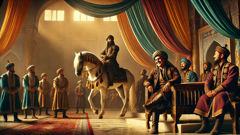
Aldar found himself at such a court one autumn when the khan decided he wanted a laugh more than a lesson. The ruler had grown tired of empty praise from ministers and needed something fresh to make him feel alive. He put a challenge into the air like a ripe melon: he would reward the first person who could make him laugh until he shed his white kerchief. A great silence fell over the marble benches. Nobles arranged their faces into the serious masks of judges and tried to invent stories of dragons and wives that would move a man of station. Poets rehearsed lines that smelled of saffron and regret, while high ministers offered anecdotes that were polished to the point of dullness.
Aldar, who had come wearing the plain coat of a passerby and a smile that suggested he’d already seen better jokes, stepped forward. He did not bow low or sculpt his words into a crown. Instead he told the khan about a merchant who took three taxes before breakfast: a tax for the road, a tax for the breeze that entertained the merchant’s hat, and a tax for the sadness of a moon that refused to glow. The khan smiled politely at first—he was a man used to being amused as a ruler rather than surprised—and then Aldar added a turn. The merchant, it was said, kept a ledger that he consulted nightly, and the ledger complained more than the merchant because it had been forced to listen to every minor oath and half-promised vow. Aldar mimicked the ledger’s voice, which sobbed about how its pages had been bent into embarrassing shapes and sometimes used as a fan in summer. Aldar leaned closer to the khan and whispered that once, the ledger had escaped and joined a caravan in search of a new life, carrying a small pillow under its first page because any book traveling naked is ill-mannered.
The court laughed like a small wave breaking against rocks, and the khan removed his kerchief with a hand that trembled slightly from the effort of holding his dignity. He laughed openly, and for a moment the khan looked like a child who had been given a bowl of unexpected sweets. The minister who had wanted to measure out honor like coin scowled, but even he could not long resist the lightness in the air. That laugh softened the court. Aldar received a small purse—a coin or two and a crust of bread—but the khan also invited him to return. It was inside that invitation that Aldar saw a chance to do more than amuse.
On his next visit, Aldar found a court angry about a dispute: a nobleman accused a herder of stealing a fine horse. The noble owned many horses and wore silk that shone like river water. He had that look rulers have when they believe their own words are law, and he expected the court to echo his certainty. The herder, quiet and sun-browned, merely stared at his hands as if they were maps to a life that had been altered by claims he could not answer. The law required proof, of course, and the noble had witnesses who could match a bridle or a mark. Yet Aldar noticed something else: the noble’s horse bore a row of new, fancy-stringed tassels along its mane—tassels that flapped extravagantly whenever the wind passed. Villagers used tassels on horses in celebration, yes, but these were not the weathered, hand-knotted tassels of someone who rode across the mountains; they were clearly made by a clothier who worked with silk and fine dye.
Aldar listened to the statements and walked to the court's arch. He told the khan a story about the origin of tassels, about a day when tassels were born from a disagreement between two old seamstresses. According to Aldar’s tale, one seamstress said, "Let tassels mark the brave," while the other insisted, "No—the brave should be known by song, not by adornments." Aldar then proposed a test: a race wherein the horse wearing only the plainest tack would run faster than the horse wearing the proudest tassels because tassels, while pretty, burdened the mind of a rider with vanity. The khan, who prized spectacle, agreed. The noble put his horse forward, tassels gleaming; the herder brought out a plain mare, steady and strong.
The race started with a shout, and a hush followed. The plain mare leapt with the calm of someone who knows the path; the tasselled horse pranced as if walking a carpet, stopping to show its ribbons and to look at its reflection in every puddle. Midway, a low wind stirred the tassels and they flapped like fat birds—startling the horse, who somersaulted its pride into a small, harmless tumble. The plain mare crossed the finish line first. The khan, who liked such lessons made obvious, declared the herder innocent because the noble’s arrogance had been made visible to all. The noble, embarrassed beyond his silk, promised restitution and learned, in a bruised way, that clothing cannot replace humility.
But not every court trick ended in trivial justice. In one quieter tale within the khan’s courtyard, Aldar used a longer game to reconcile two feuding brothers who had divided their father’s land in anger. The brothers had split a herd and argued over which pastures were the real gift of their father. Each claimed the greener moonside was his right; each swore oaths with the seriousness of men who stake life on names. Aldar proposed a strange test: he offered each brother an empty leather bag and asked them to fill it with something that proved they understood the steppe. The first brother filled his bag with the granules of old campaigns—brassy nails, fragments of an old saddle, and legal papers showing his ownership. The second boy filled his bag with a handful of soil, a stone smoothed by river current, and the feather of a crane.
Aldar suggested they go out to the place where they debated, empty their bags, and plant their proofs into the earth. The crowd watched as legal paper took the wind like feathers and the feather and stone sunk into soil as if asking the earth for judgment. At harvest, the patch where earth and feather had been showed a stubborn green while the patch where paper had tried to command the soil yielded only weeds. The khan declared that the land that grows belongs to those who live with the land, not those who think ownership can be printed and stamped. The brothers were given part of each pasture and made a pact, not because a judge forced them, but because the land itself had settled the argument in a way both could watch and accept.
Aldar’s lessons in court never sounded like sermons. They smelled of sizzling lamb, of horse sweat, and sometimes of the distant sea that certain caravans claimed to have seen. He used the khan’s desire for entertainment to make justice visible, to turn pride into a lesson that anyone could see and, most importantly, to leave the ruler with a hunger for mercy rather than only for spectacle. Aldar did not overthrow the khan; he softened him.
Perhaps Aldar’s greatest court triumph involved no race or musical measure, but the subtle act of making a judge ask a question rather than pronounce a sentence. A poor craftsman accused a wealthy noble’s steward of breaking a tool in a drunken exchange and then demanding the craftsman pay for its repair. The steward had witnesses and coin; the craftsman had a thin neck and a stubborn heart. Aldar suggested that the judge weigh the value not by the tool’s coin but by the time it took to craft it, and then compare that to how many meals were fed by the steward’s blunders. The judge, who held the khan’s attention, thought about time and meals and felt an unease with the ledger’s sharpness. He ruled that restitution must equal not only the tool but the honor lost in the insult, and the steward, surprised to find compassion counted in coin, paid the craftsman and offered an apology. The craftsman returned to his bench with a new tool and a new belief that the law sometimes bows to common sense—and to a trickster who knows the right time to make a ruler laugh and then think.
Conclusion
Aldar Kose’s tales are not merely pranks for their own sake; they are small acts of repair. He ties a rag to a fence post where grief might have been a loose end and hums a tune that helps people remember their neighbors. He is beardless, quick-tongued, and oddly tender—like someone who knows the value of a word given at the right moment. These stories remind us that justice need not always come wrapped in steel, and that sometimes the gentlest cunning can unpick a knot tied by arrogance. On the wide steppe, where seasons move like slow questions, Aldar taught that pride can be unraveled with humor and that generosity grows best when it is shared as a laugh around a fire. Carry these tales like a small warm thing in your pocket and let them out when you meet someone sure of their own importance: a market merchant, a petty official, a rich noble who forgets how heavy his coin makes him. Tell the children the story of the laughing cup and teach them to measure by song; let the khan hear the tassel race and, if you can, nudge him toward mercy. These are not prescriptions but invitations—to choose wit over wrath, to trade a trick for a correction, and to let the steppe, with its wide sky and stubborn grasses, teach those who travel it how to be both clever and kind.

